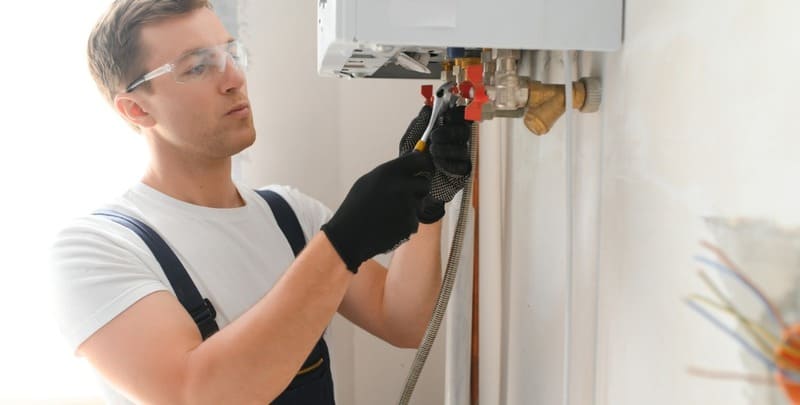
6 Signs You Need Hot Water System Replacement
We all love our hot water systems, they provide us with a life necessity and frankly, we couldn’t live without them.
From gas to solar, storage tank to continuous flow, there are many types and sizes of hot water systems in homes all across Australia. When your hot water system is having problems, it can become a serious inconvenience to your life. Look out for these six warning signs that a hot water system replacement might be on the cards for you sooner than you expect.
1. Warm/Cold Water
When a hot water system’s only job is to create hot water, it’s an obvious warning sign if it simply isn’t doing that. You may find mildly warm or even straight-up cold water flowing from your taps. The reason it may be doing this could be one of many.
There may simply be an issue with the natural gas or electricity supply that feeds it, but this is rare. It usually comes down to faulty, defective or simply worn-out heating elements or thermostats. Often parts for hot water systems can be pricey and depending on the age of the unit, it is usually best to replace the whole system.
2. Age
This is an obvious one. Like any household appliance, hot water systems have a limit as to how long they can last. Most units from top brands in Australia will outlive their warranty, but it depends on many factors. Climate, usage, hot water heater quality and location all factor into how long a unit can produce hot water reliably.
Most units have a warranty between 5-10 years depending on the brand, model and size. This is a good general ballpark figure, however, it shouldn’t be taken as gospel.
3. Noise
No one likes a noisy home appliance. It can disturb your peace as well as the neighbours and hot water systems are no exception. The most common cause of a noisy hot water system is simply loose or worn-out parts.
It could be rattling, hissing, screeching, or banging, there are a whole lot of noises a machine can make. They aren’t designed to be whisper quiet by nature, but if it’s creating a serious disturbance to your life every time you turn on the hot water tap, get a professional in to look at it, because you may need a new system.

4. Rust and Corrosion
This is possibly the most damning sign that your system needs replacing. You can’t fix a rusty or corroded system.
Rust causes parts and fittings to crack and begin to leak, which can then let the rust into your water. This can be dangerous for your health. If you notice your water is a browny, reddish colour, cease use of it altogether.
Rusty parts generally aren’t replaceable, so your best bet here will be a brand-new system. Rust and corrosion can be caused by elements like the climate as well as water quality.
5. Leaks
Leaks are so often dismissed as a non-issue. People think that a little bit of water dripping won’t hurt them. That water adds up, and if not attended to, can cost you hundreds in water bills. Leaky hot water systems are a common perpetrator.
Leaks can be caused by faulty parts and fittings, or simply old and worn-out ones. If your system is leaking excessively, it may be time to move on to a new hot water system.
6. Increased Demand
Have you been adding to the family? Maybe your 12L continuous flow efficient hot water system was adequate when it was just you and maybe your partner. But once kids come along, you’ll need to revise just how much hot water you need, and your existing hot water system might not be able to keep up.
If you find that doing the dishes while your kids shower and the washing machine is on leaves you with very low water pressure and lukewarm water, your hot water system isn’t fit for the job anymore. You can upgrade to bigger sizes with ease, with continuous flow models going up to even 30L, nearly tripling your hot water delivery.
So, What System Should I Get Then?
When you need to consider a hot water system replacement, you effectively need to consider what will be the right hot water system for your home, your family and your household budget. You have some options up your sleeve.
Gas Hot Water Systems
When considering a new hot water system, many Australian homeowners look towards a gas hot water heater as a reliable option. Here’s what to keep in mind:
- Gas hot water systems heat water quickly and are more energy-efficient than electric models, leading to potential cost savings.
- However, they can be expensive to install, especially if your home needs a new gas connection.
- The environmental impact of a gas-powered system can also be higher compared to renewable energy systems, which is an important factor in today’s climate-aware society.
It’s clear that while a gas hot water system is efficient and effective, the initial setup costs and environmental considerations are important drawbacks that should be weighed carefully.
Electric Hot Water Systems
For a straightforward and often economical installation, many homeowners look to electric hot water systems for their homes. Here are the details:
- An electric hot water system is less expensive upfront and offers great installation flexibility.
- They are an excellent choice in areas without access to natural gas.
- On the downside, running costs can be significantly higher over time due to higher electricity costs and are less environmentally friendly.
Despite these potential drawbacks, electric systems remain a popular choice due to their initial affordability and ease of installation.
Solar Hot Water System
Solar power is highly regarded in the realm of sustainable living and for good reason. If you’re leaning towards a greener lifestyle, here’s what solar hot water systems offer:
- Solar water heaters use renewable energy, which can dramatically lower your household’s carbon emissions and energy bills.
- Government rebates can offset the high initial investment required for these systems.
- The efficiency of solar systems, however, is weather-dependent and they require significant space for installation.
Solar hot water systems are an excellent long-term investment, especially for those committed to eco-friendly living, but they do come with considerations regarding cost, weather, and space.
Heat Pump Hot Water Heaters
Heat pump hot water systems are gaining traction as an energy-efficient alternative. Here’s why they might be the right choice for your home:
- Heat pumps power a much more efficient hot water system than traditional electric heaters, extracting heat from the air around them.
- They’re versatile across various Australian climates and come with enticing government rebates for their eco-friendly nature.
- The initial cost and potential for decreased efficiency in colder weather are notable concerns, as is the operational noise level.
While the efficiency and environmental benefits of heat pump systems are appealing, the higher upfront cost and performance in cold weather are factors you’ll certainly need to consider.
Storage Heater vs Continuous Flow Systems
Another key factor to consider when it comes to a new hot water service is whether you choose a continuous flow system or opt for a storage tank hot water system installation. So how do each of these systems differ?
Storage tank hot water systems keep a consistent supply of hot water ready for use in an insulated tank. They can be quite convenient for high-usage periods, but due to their heat loss, can be less energy-efficient.
Continuous flow systems, also known as a tankless or instantaneous system, heats water on demand. It provides an endless hot water supply without the standby energy losses associated with storage tanks. This makes them more energy-efficient and space-saving. However, they may struggle to supply sufficient hot water during peak times to multiple outlets simultaneously. The choice between the two depends on household hot water usage patterns, space considerations, and energy efficiency priorities.
Speak to Your Trusted Metropolitan Hot Water Specialist
If you need help deciding on the right hot water system to upgrade to, your friendly Metropolitan Plumbing local expert is always around the corner to help. Whether you’re looking at electric instantaneous water heaters, gas storage systems, heat pumps or solar panels, we’re here to help. We can give you the full low down on the hot water system brands we carry, and ultimately help you with your hot water system replacement needs.
Please note: This information is provided for advice purposes only. Regulations differ from state to state, so please consult your local authorities or an industry professional before proceeding with any work. See our Terms & Conditions here.
Published: 2020-02-20

















